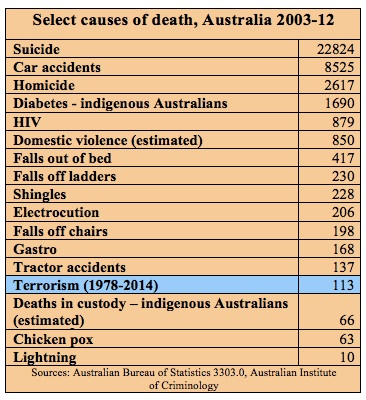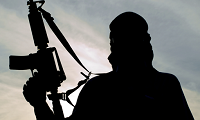Bernard Keane has been tracking the numbers at Crikey. Since the Hilton Hotel bombing in Sydney in 1978 a total of 113 Australians, at home and abroad, have died from terrorism.
In a New Matilda exclusive Chris Graham brings us the shocking death toll of Australians on Australian soil at the hands of Muslim terrorists – zero!
In the 10 years from 2003 to 2012 a total of 417 people in Australia died from falling out of bed, 230 from falling off ladders and 198 from falling off chairs. Rational analysis tells us that we are more at risk from ourselves and our loved ones than from terrorists. Suicides come in at 22,800 and homicides at 2,617. Somewhere between 700 and 1000 women and children have been killed by their parents or partners.
The toll from car accidents (excluding pedestrians and other vehicles) was 8,500 in the 10 years.
Now Keane has had a look at workplace safety:
As of mid-September, 129 Australians have been killed at work, compared to 125 people killed to the equivalent point in 2013, Safe Work Australia statistics show. The mining sector has already exceeded the death toll for the whole of 2013, with 12 people killed, and the construction industry has already claimed 18 lives, already one more than for the whole of 2013. Transport, the biggest sector for workplace deaths, is also performing worse than 2013, while agriculture, second biggest, is tracking around the same as last year.
The rise in workplace deaths this year defies years of improved workplace safety data: the incidence of workplace deaths rose from 2003-04, peaked in 2007-08 and has fallen dramatically since then, with an overall incidence rate in 2011-12 nearly half of what it was in 2002. Even so, 186 Australians went to work in 2013 and didn’t come home…
Here’s a graphic of select causes of death in 2003-12:

There are some preventable health and social justice issues that jump out of the statistics. Indigenous Australians, for example, are seven times more likely to die from diabetes than are other Australians. Keane questions our resource allocation priorities.
Problem is that many causes of death are ‘normal’ in terms of our emotional reaction, unless someone near to us is involved or there is emotional engagement for some other reason. Terrorism is, of course, designed to strike fear.
Our spooks have used this fear to gain ‘improvements’ to the security laws. Matthew Knott has an excellent explainer at the SMH:
So what’s in the new laws? They cover four main areas:
- greater protection for intelligence officers who commit crimes while conducting operations;
- cracking down on the leaking and publication of information about secret operations;
- expanding ASIO’s access to computer networks;
- making it easier for Australia’s spying agencies to work together.
The second is likely to have a chilling effect on reporting. For example, if a reporter was tipped off that surveillance equipment was being installed in the East Timor cabinet room under an Australian aid project, he or she would be reluctant to report it and risk up to 10 years jail.
On the third, it seems the spooks will be able to go anywhere they choose on the internet.
Labor has waved these laws through in the Senate, leaving critique to the Greens and some of the cross-bench:
The bill passed the Senate, 44 votes to 12. The Government, Opposition and Palmer United Party voted for the legislation, along with the Motoring Enthusiasts Party Senator Ricky Muir, and Family First’s Bob Day.
The Greens, Senators Xenophon, Leyonhjelm, and Senator John Madigan were all opposed.
This spineless approach from Labor bespeaks political pragmatism rather than principle.

